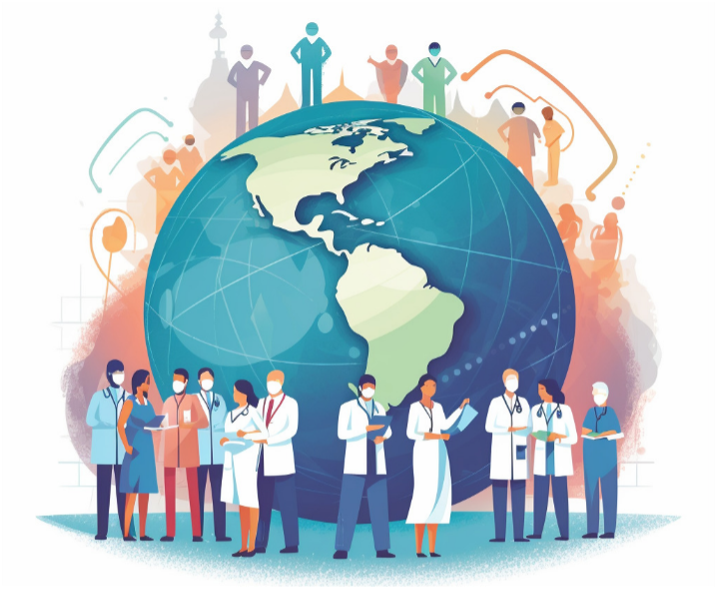Global health is an urgent and evolving field, critical to the wellbeing of communities worldwide. Recent discussions by prominent figures like Atul Gawande emphasize the significant impact of health policies and infrastructures on global disease management and response. With the alarming cuts at USAID and the subsequent dismantling of health programs, millions are left vulnerable, highlighting the need for renewed support in health and science. Gawande’s observations shed light on the resilience required to rebuild global health systems, particularly in the wake of devastating health policies that have compromised essential services. As the world faces challenges that transcend borders, the commitment to enhancing global health is more crucial than ever.
The interconnected nature of public health transcends national boundaries, impacting societies on a global scale. This field, often referred to as international health or global wellness, navigates the complexities of disease prevention and health promotion among diverse populations. Our understanding of these issues is deepened by the experiences and insights shared by health professionals like Gawande, emphasizing the critical need for a robust global health infrastructure. Furthermore, the refusal to support effective health and science initiatives can lead to catastrophic consequences, underscoring the importance of comprehensive health policies. As nations grapple with their role in promoting global health, collective action and innovative solutions will be essential for addressing the pressing health challenges ahead.
The Crisis of Global Health Infrastructure
The dismantling of the U.S. Agency for International Development (USAID) under the previous administration has left a void in global health infrastructure that is both alarming and detrimental. Atul Gawande, a prominent surgeon and author, emphasized that such actions have not only affected international aid but have severely undermined the support structures necessary for health development globally. The agency’s significant role in combating infectious diseases and supporting maternal health programs has been diminished, leaving millions without access to essential health services. Without a robust infrastructure, efforts to monitor and respond to outbreaks, like Ebola or COVID-19, are severely impaired.
The consequences of this erosion are far-reaching, as the loss of funding and personnel translates directly to poorer health outcomes for vulnerable populations across the globe. Gawande noted that USAID’s previous capacity to reduce emergency response times from weeks to mere hours is now at risk. Such logistical prowess is crucial in a world where pandemics can emerge suddenly and spread rapidly. As advocates for global health, we must recognize the critical need to restore this infrastructure to ensure a swift and effective response to health crises.
Frequently Asked Questions
What is Atul Gawande’s perspective on the impact of USAID cuts on global health?
Atul Gawande highlights the devastating effects of the cuts made to USAID, emphasizing that the agency’s dismantling has severely compromised global health efforts. He notes that the loss of staff and the termination of programs have harmed millions worldwide, suggesting that while USAID cannot revert to its previous state, there is still hope for restoring health and science support.
How has USAID contributed to improving global health infrastructures?
USAID has played a crucial role in enhancing global health infrastructures by establishing extensive networks in over 50 countries to monitor and respond to deadly outbreaks like Ebola and bird flu. Gawande cites that these programs have significantly reduced emergency response times for global health crises, thereby saving countless lives and improving health outcomes across various populations.
What role does health and science support play in preventing maternal and child deaths worldwide?
Health and science support provided by agencies like USAID has led to the implementation of programs that have successfully reduced maternal and child mortality rates. According to Gawande, initiatives that focus on education, treatment, and prevention have significantly increased life expectancy for women and children, demonstrating the profound impact of global health investments.
What challenges does global health face currently according to Atul Gawande?
Gawande identifies significant challenges facing global health today, primarily due to funding freezes and staff cuts impacting federal programs such as the NIH and CDC. He stresses the urgent need for sustained investment in health and science infrastructure to combat growing threats to global health, including the deterioration of services that directly affect health outcomes.
Why is Atul Gawande optimistic about the future of global health despite current setbacks?
Despite the challenges outlined, Gawande remains optimistic about the future of global health. He believes that the commitment and expertise within the health community will be essential regardless of political changes in the U.S. His encouragement for upcoming health professionals underscores the importance of their roles in continuing the global health mission.
| Key Points |
|---|
| Atul Gawande discusses the adverse effects of the Trump administration’s cuts to USAID, highlighting the impact on global health programs and infrastructure. |
| Despite the devastating changes, Gawande emphasizes the importance of commitment to science and medicine amidst the challenges. |
| USAID, under Gawande’s tenure, had a significant role in healthcare advancements, including disease surveillance and maternal health improvements. |
| The current freeze on funding threatens essential health programs, including significant research projects at Harvard. |
| Gawande remains hopeful about the future of global health, though he expresses uncertainty about the U.S. commitment to leadership in this area. |
| He stresses the continued need for expertise and collaboration at all levels of global health, regardless of U.S. leadership. |
Summary
Global health is facing unprecedented challenges due to drastic cuts to essential funding and programs, particularly during the Trump administration’s restructuring of USAID. As discussed by Atul Gawande, the ramifications of these changes have far-reaching effects on healthcare infrastructure both domestically and internationally. However, there remains hope for recovery and advancement in global health, driven by commitment, collaboration, and the tireless efforts of professionals dedicated to improving health outcomes worldwide.
